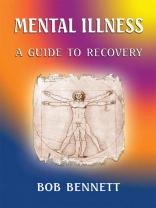Mental Illness: A Guide to Recovery gives you information, gleaned from many sources, which can help you learn to recover. Coping skills needed to deal with the illness can be developed. Materials which can help you reduce symptoms are presented. Recovery does not happen overnight, but step by step, most can make significant recovery.
Humpty Dumpty had a great fall… and all the king’s horses and all the king’s men couldn’t put Humpty Dumpty back together again. The same holds true for those of us with a mental illness. The psychiatrists, psychologists, social workers, etc. can assist, but it is up to the individual to create conditions which will allow recovery to happen.
The neurobiological basis of mental illness is often presented in a fatalistic way. That’s the brain chemistry you’ve got, and that’s what you’re stuck with; as if the individual was unable to change the chemistry inside his or her own head. Breathing changes brain chemistry. So does exercise, the food you eat, the words you speak, the thoughts you think as well as how often you smile.
While drugs are capable of making radical changes in the chemistry of the brain, it is the slow changes over time which will help most in recovery.
‘Thorough and informative without being technical …fascinating…very enlightening.’ Psychiatric Rehabilition Journal (Vol. 28 No.4 Spring 2005 )
‘You have made a complex issue easier to understand.’ Chief Kathryn Landreth, Las Vegas Metropolitan Police.
Giới thiệu về tác giả
Bob won Honorable Mention from the Pacific Research Institute, in 1992, for a paper he wrote on how Mental Health Courts could save communities money while providing better for treatment for those with a mental health diagnosis. At the time no mental health courts existed, now hundreds can be found throughout the country. As volunteer Mental Health Coordinator for the Nevada ACLU, he worked on the committee which formed Nevada’s first Mental Health Court. He is a member of NAMI’s Consumer Restraint and Seclusion committee, and was awarded Advocate of the year in 2007 from the National Association of Peer Specialists. His column on Mental Health issues was published in The Nevada Observer from 2006-2009. He is the chair of the PAIMI counsel for the Nevada Disability Advocacy Law Center, past member of the MHPAC for the State of Nevada and a past member of the Inyo County, California, Board of Mental Health. Currently he gives presentations on Alternative and Complementary Treatments for Mental Health Recovery.












